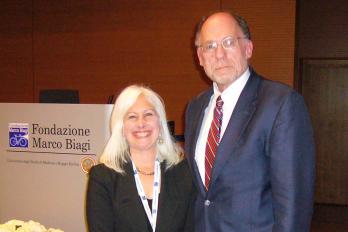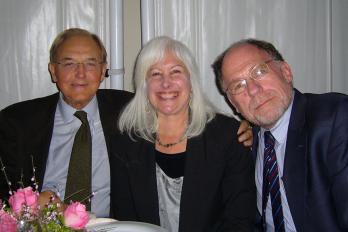Professor Susan Bisom-Rapp Presents at Conference in Modena, Italy
March 26, 2012
Professor Susan Bisom-Rapp returned to the Marco Biagi Foundation at the University of Modena in Modena, Italy to participate in The Tenth Annual Comparative Labour Law Conference in Commemoration of Marco Biagi. This was the sixth conference in a row that Professor Bisom-Rapp has attended. This year, Professor Bisom-Rapp and her co-author Mike Zimmer of Loyola University Chicago School of Law presented a paper, which they recently posted on SSRN, North American Border Wars: The Role of Canadian And American Scholarship in U.S. Labor Law Reform Debates. Their presentation took place on March 19, 2012.
According to Professor Bisom-Rapp, “The economies of Canada and the United States and the organization of their societies are deeply interrelated but significant differences exist. Our paper traces the interaction between the two countries in the development of labor relations laws with a particular emphasis on the impact of scholarly work on U.S. labor law reform debates in the last two decades.” Instructive for that purpose is the work of Professor Paul Weiler, a prominent figure in labor law policy discussions in both countries. A significant architect of labor law in Canada, Professor Weiler came to Harvard Law School in 1978 and brought his experience and insights with him, rapidly becoming one of the foremost labor law scholars in the United States. His influence in the 1990s, and hence the influence of Canadian ideas, on the ultimately unsuccessful labor law reform proposals of President Clinton’s Dunlop Commission is widely recognized.
Professor Bisom-Rapp notes that “Professor Weiler’s proposals are once again the basis for scholarly and policy debate.” This time, however, Canadian ideas and experience have prompted a scholarly border skirmish. Recently, when new legislation – the Employee Free Choice Act – was proposed to Congress to implement a number of reforms of the National Labor Relations Act based on the Canadian experience, one U.S. academic argued that the actual Canadian experience where these reforms were in place resulted in higher unemployment and slower economic growth. Canadian labor scholars, fearing the corrosive effects of such critiques on their own labor relations regime, responded by challenging the work of the American scholar. “Clearly,” said Bisom-Rapp, “Canadian-influenced labor law scholarship has played a central role in U.S. policy debates, creating a favorable intellectual environment for labor law convergence. Yet the opponents of U.S. labor law reform also deploy scholarship aimed at the Canadian experience in order reinforce the divergent paths of the two systems, as do Canadian scholars acting defensively to forestall greater convergence of the Canadian regime to the U.S. model.”
In addition to presenting her co-authored paper, Professor Bisom-Rapp also helped coordinate and served as a commentator for the Marco Biagi Foundation’s Young Scholars’ Workshop in Labour Relations, which took place on March 22, 2012. Ten scholars at the very start of their careers presented their works and received feedback from senior scholars in the field. “To be honest,” said Professor Bisom-Rapp, “this was my favorite part of the conference. To listen to how new thinkers approach timeless workplace problems gives me great hope for the future.”
The annual conference is in memory of Professor Biagi, who was assassinated ten years ago by the Red Brigades for having proposed changes to Italian labor law. Professor Bisom-Rapp serves on the international council of the Marco Biagi Foundation at the University of Modena.

